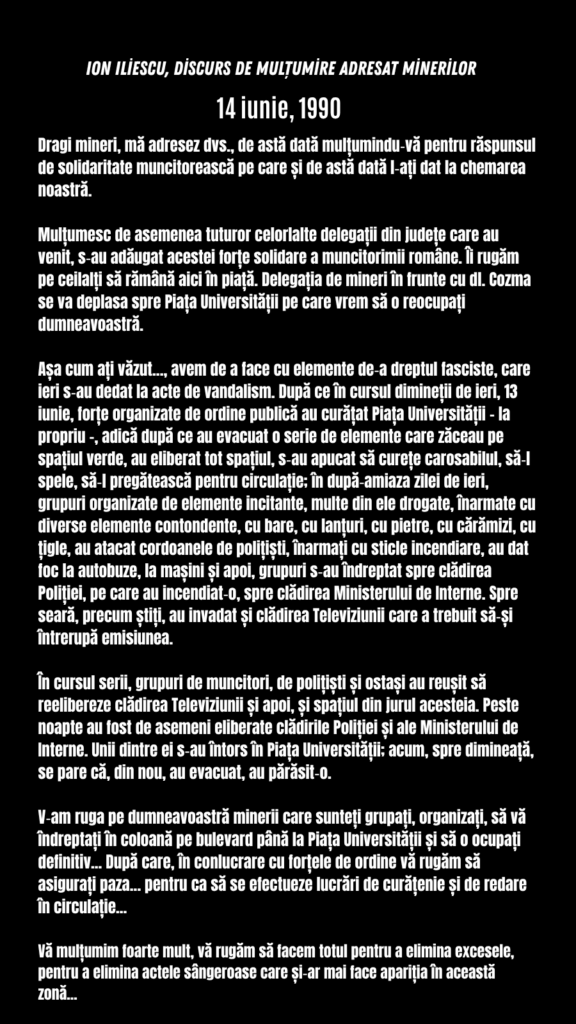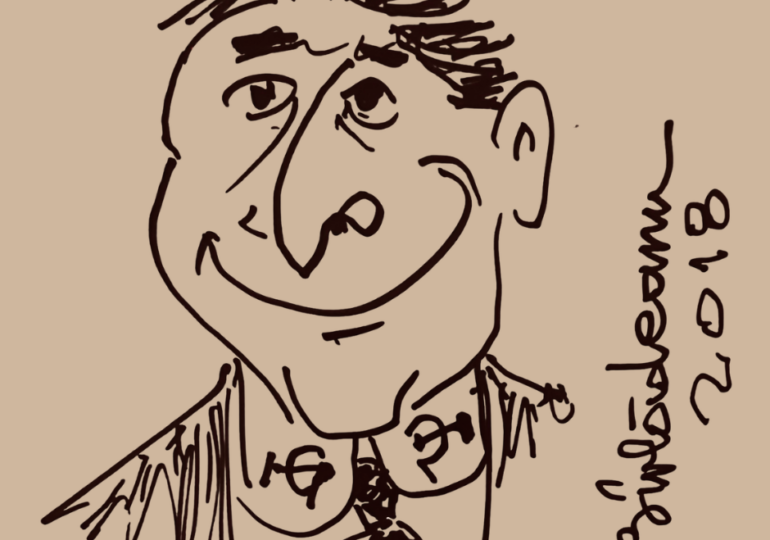In recent years, I have often looked at the caricature made by artist Ion Bîrlădeanu (1946-2021) of the former president, who passed away yesterday, August 5, 2025.
In a few lines, the brilliant creator of collages and drawings with a political undertone managed to describe Iliescu’s personality, his unwavering beliefs, and the historical labyrinth through which he led his existence and survived, despite ordering repressive actions against innocent citizens, dividing Romania, and causing deaths due to his decisions.
In Bîrlădeanu's caricature, Iliescu has a slightly sly look, but the imperfection indirectly reflects the detachment of the former president in moments of maximum social tension.
Who remembers his speech upon the arrival of the miners on June 14, 1990 at RomExpo, or the negotiation with the leaders of historical parties on January 28 of the same year, knows what I am referring to.
While people were being beaten, injured, and killed by the repressive forces, Iliescu spoke about democracy, freedom, about being stabbed in the back by Corneliu Coposu, the leader of the PNȚ-CD, who contested his legitimacy.
The innocent look is supported, in Bîrlădeanu's drawing, by the famous smile with which he paraded through three terms (1990-1992, 1992-1996, 2000-2004), trying to convey that the situation was under control, although Romania, after serious internal conflicts, was isolated for a decade.
On the two lapels of the shirt collar, Bîrlădeanu cryptically drew the symbol of communism - the sickle and hammer - which upon closer inspection also resemble the symbol of the euro, in my opinion, a mix indicating the complex process of Romania's exit from Moscow's sphere of influence and European integration.
The artist exaggerated the size of the nose to caricature the features and give the portrait an ironic touch, suggesting that he managed to deceive history and his own people.
From the initial messages and reactions on social media, a large part of public opinion announces that they have not forgotten and are not willing to forgive the violence in 1989 and the way opposition and street protests were repressed in the '90s.
- Reactions to the death of Ion Iliescu - strong contrast between messages from PSD, USR, and PNL. What Nicușor Dan and PF Daniel say
- Foreign press reflects the contrasting legacy left by Ion Iliescu - from joining NATO to crimes against humanity

The major problem of the former president is that he usurped power after the fall of Nicolae Ceaușescu through political machinations, supported by a group of individuals with connections to the Kremlin.
The power vacuum created by the downfall of Ceaușescu's regime was quickly filled by Iliescu, who came before the nation and stated that he would not run for elections, but would only hold power for a limited period until the political situation stabilized.
Why did he make that promise? Why did he change his mind? These are two questions to which he never provided answers.
That lie from those days corroded the foundation of Romanian society like a cancer, causing an untreated suffering, not to mention healing.
Since then, society has been divided into those who felt betrayed, considering the revolution confiscated, and those who benefited from the political changes, some of whom were former tormentors, saved and protected by the new leader Ion Iliescu.
It is hard to say what secrets, information, and support Iliescu received from the Kremlin and the political elite around Ceaușescu who bought their survival, as the power system formed then protected him until his last breath.
Ion Iliescu was never a democrat, but a cynical politician interested in preserving power and influence as much as possible.
For those who do not know, immediately after taking office, the Minister of Defense became Nicolae Militaru, a Soviet agent, marked by Romanian counterintelligence since Ceaușescu's time, and the entire Romanian espionage was handed over to Mihai Caraman, also a Soviet agent who transmitted NATO's secret information to the Kremlin.
Caraman led the SIE (Foreign Intelligence Service) until 1992 and left only as a result of the collapse of the Soviet Union, leaving Iliescu without Moscow's support for a period.
In my opinion, by researching and analyzing the behavior and decisions of the former president, Iliescu never thought about Romania. He did not have a vision for the country, one for the future. Many of his decisions were the result of political calculations, steps taken with the immediate goal of remaining in power.
Until the collapse of the USSR in August 1991, a period of one year and eight months, Romania was completely at the mercy of Moscow by Ion Iliescu and his circle of spies and KGB and GRU agents. That decision to seize power by force, against the broader public that since December had sent a clear message: "Down with communism!", has significant consequences even today.
Călin Georgescu and all the disaster produced last year are late effects of the fact that Iliescu came to power undemocratically in December 1989, then implemented a sinister plan of violence and internal confrontations to present himself to a scared and intimidated nation as the only savior.

